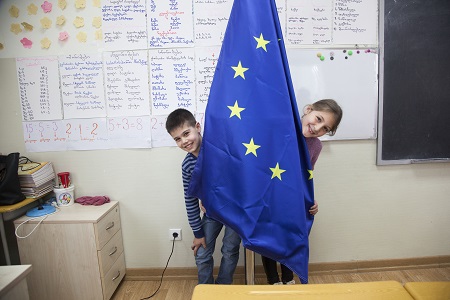Georgia’s bid to be a European neighbor


It is now quite widely believed that Georgia’s European integration is irreversible, and that Europe is where Georgia belongs. Yet people in Georgia still often ask each other what are the benefits of the EU-Georgia Association Agreement (AA), signed in June 2014. The short answer is Georgia’s closer political and economic ties to the European Union.
But the follow-up question is, ‘how far and how fast can we go?’ My answer is that it depends upon the hard work of us, the citizens of Georgia.
If you had asked the same question more than twenty years ago, in 1992 when Georgia started its cooperation with the EU after it had regained its independence from a disintegrating Soviet Union, the answer then, from the perspective of a post-Soviet country, would have been very different: Georgia does not belong to Europe and Europe is very far away from Georgia.

Tbilisi TV Tower and the Administration of Georgian Government lit up in the EU flag colours. Photo by Nino Alavidze/Agenda.ge.
Since those days, however, the ever-deeper Euro-Atlantic and European integration process has been our way of returning to the family of European nations. Along this way, we have been encouraged by the many signs of support from EU leaders. As far back as 1999, at the ceremony dedicated to Georgia's accession to the Council of Europe, the President of the Parliamentary Assembly, Lord Russell-Johnston, addressed the Georgian delegation with the following words: "Georgia, welcome back home!"
Welcome back to the family of European nations means sharing with them the history, culture and most importantly, values. Here is another question, relating to values. If we conducted a poll and asked Georgian citizens if they want to live in a society where there is dignity, freedom, solidarity, equality or justice, almost all of those surveyed would say yes.
But if we formulate the question like this, ‘Do you want your child to study together with the disabled person at school?’, you would be sure to find that parents that would be against it. However, local law now obliges educational institutions to implement inclusive study, and society more or less appreciates the system. People usually react to change with anxiety, and it makes us wonder if we’re up for the challenge.

Boy is drawing the EU flag at the lesson in the school at IDP's settlement Tserovani in Georgia. Photo by Nino Alavidze/Agenda.ge.
Aside from the general fear of change, unemployment is the major public policy challenge in Georgia, and it’s an issue that makes people distrustful of the EU. Among ordinary citizens over the age of 50, you will find people who wish they could still work in an industry like they had worked in the former Soviet Republic’s enterprises. They believe it is the modern economy and the European standards that have made them unemployed, even though they know deep down that the products produced in their former enterprises were useless, and that in the current market situation this kind of enterprises cannot exist.
Providing a neighbouring country of Europe, like Georgia, with a perspective of European integration remains the best stimulus for many reforms. Signing the EU-Georgia Association Agreement, which includes a Deep and Comprehensive Free Trade Area (AA/DCFTA) was a fact of historic significance for the expansion of relations for Georgia’s European future.
Georgia has to align much of its legislation with that of the EU to comply with the AA. But the question is to what extent society is ready for this transformation. It makes us wonder if we are up for the challenge, when anti-westerners fuel public anxieties for each amendment implemented in the laws, saying that it kills Georgia’s future, and that everything is being done for Europe and not for the Georgian people.

Celebration of the signing of EU-Georgia Association Agreement in Tbilisi on June 27, 2014. Photo by Nino Alavidze/Agenda.ge.
For Georgia’s democratic institutions, these reforms require immense focus and coordination, and belief in what they are doing. We will certainly also need to confront further the vested interests of pro-Russian propagandists, but it is encouraging that 85% of Georgians support the EU integration path, according to a recent poll published by the International Republican Institute’s (IRI) Center for Insights in Survey Research.
Estimated as of crucial importance for Georgia’s economy, the DCFTA implements three out of four freedoms: free movement of goods, service and capital between Georgia and the EU. In the private sector, the DCFTA contributes to economic growth, promotes integration with world markets and global supply chains, as well as opening new prospects for Georgia and for entrepreneurs doing business in our country. Products or services produced in Georgia get free access to the EU market.
Georgia’s next step on the European journey is gaining the fourth freedom, which is free movement of people, and becoming the second country from the Eastern Partnership after Moldova whose citizens can travel without a visa to the Schengen area. Only the political decision from EU leaders is left and there is the highest expectation from Georgian people that from early autumn this year, visa-free travel will be possible. Visa-free travel would also fall in the ambit of people-to people contacts that will strengthen EU values in Georgia.
Georgia’s next bid could be EU membership, but the country may not be ready today for it, and we have to use all the benefits that the AA gives us as a neighboring country of the EU.
 Tweet
Tweet  Share
Share